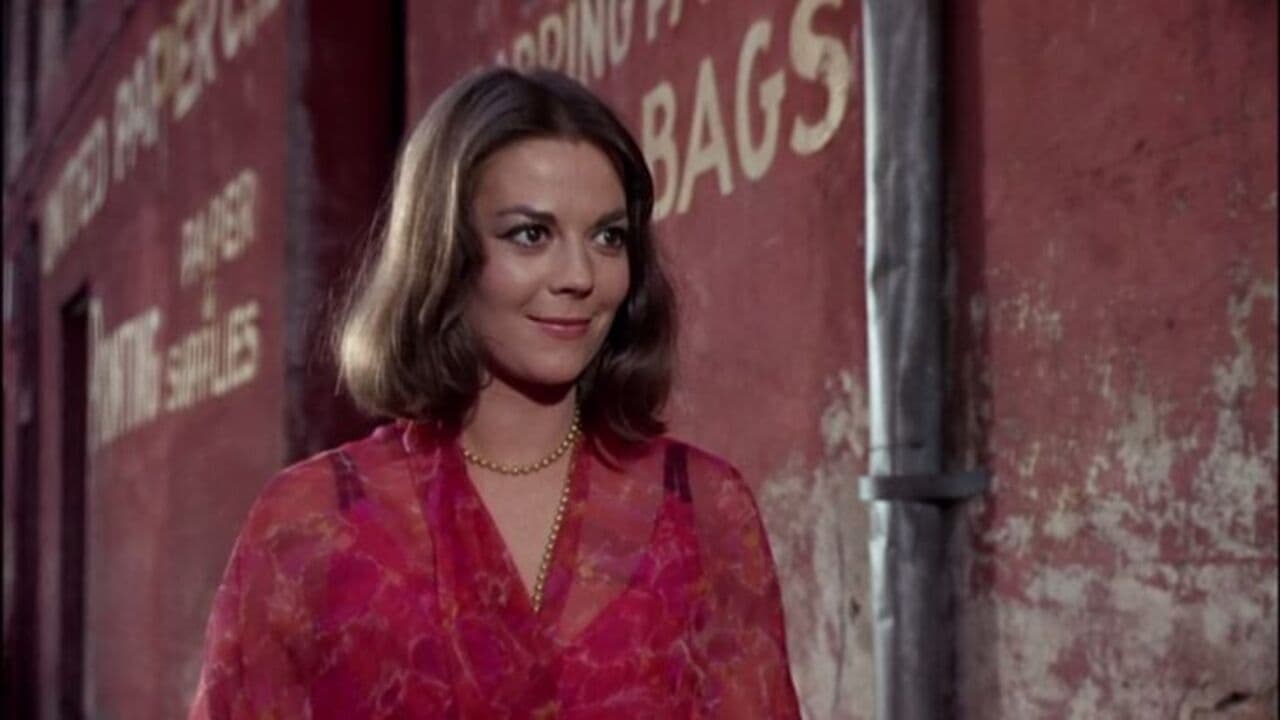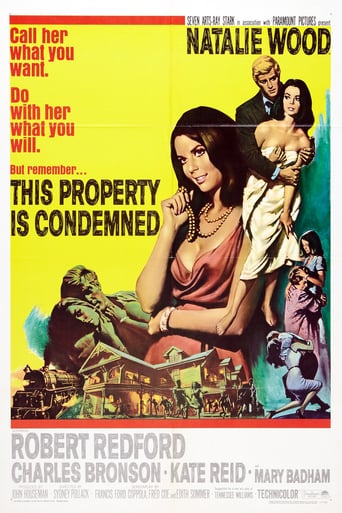



What makes it different from others?
recommended
Perfectly adorable
Good idea lost in the noise
Willie Starr (Mary Badham) is walking the train tracks next to her home in Dodson, Mississippi. It's her family's boarding house since condemned. She is befriended by Tom and she recounts the former glory days of the lively house. The beauty of her sister Alva (Natalie Wood) entrances newly arrived railway man Owen Legate (Robert Redford). Everybody wants her including mama's boyfriend J.J. Nichols (Charles Bronson). It's later revealed Owen's true purpose in town.This was adapted from a Tennessee Williams one act play. Writers include Francis Ford Coppola and the director is Sydney Pollack. With such great beautiful stars, this really can't lose. Natalie Wood is vamping for all her worth but Redford is holding back in a cool demeanor. Mary Badham played Scout in To Kill a Mockingbird. It's too bad that she couldn't succeed beyond a child star. She's loads of energy and has a very compelling screen presence. This may not be a classic but it does hold some nice stuff that movie lovers should check out. The length is a bit over-extended. When they leave the town, the movie loses a bit of intensity. It would be better to resolve the story and ride out into the sunset.
View MoreExcellent performances by Wood and Redford (as well as the others), great feel of the poor southern town, compelling human emotions. Cinematography was outstanding. Some of the camera work seemed to preview Butch Cassidy, one of my all-time classics. Wood's free-spirited and naive nature was compelling, and Redford, understated as always, was a fantastic counterpoint for her. Mary Badham, following on her role as Scout in To Kill A Mockingbird, brought her role to life and was very sympathetic as well. It is interesting that at 13, this was her penultimate role for almost 40 years. I wonder what happened? I generally rate movies on how they make me feel, and this one connected me to the characters, the time and place, and made me feel empathy and admiration, respect, and/or concern for them. Well done, Sydney Pollack.My scale: 1-5 decreasing degrees of "terrible", with 5 being "mediocre"6- OK. Generally held my interest OR had reasonable cast and/or cinematography, might watch it again 7 - Good. My default rating for a movie I liked enough to watch again, but didn't rise to the upper echelons 8- Very Good. Would watch again and recommend to others 9- Outstanding. Would watch over and over; top 10% of my ratings10 - A Classic (6 of 430 movies have received this)
View MoreA small town southern girl is exploited by her mother until a handsome stranger comes to town. The romantic tale is told in one long flashback. Overall, it's a slow going star vehicle. I may be a minority, but Wood's unabashed histrionics do get tiresome. Too often, we get the point without her heavy-handed effusions, ones that kept reminding me that this is just a movie, after all. All in all, Wood's Alva and Redford's Owen amount to emotionally repressed opposites. He's all walled-off emotion and starkly tied to reality, while she's all dreams and escape from a dreary existence. Owen's icy attitude is understandable since his job amounts to ruthlessly laying off working men. As a result, he can't afford to acknowledge his true feelings. But Alva's character is also understandable (Reid) since her life is emotionally barren thanks to a ruthless Mom (Reid), a cheap boardinghouse, and a round of men pimped by Mother. Thus Alva's emotionally confused and victimized. Nonetheless, each could provide what the other needs to overcome their crippling isolation.That's a good premise, but the package is really overdone by both Wood and indulgent director Pollack. On one hand, Pollack's bound down by a spotty script with scenes that too often fail to advance the plot. On the other, the director too often stretches things out by indulging in fashionable slow pans. Fortunately, photographer Howe blends the colors of Depression era poverty in a smoothly done style. And catch spunky little Mary Badham stealing the film as a plain-faced adolescent. Her manner is both refreshing and natural. Too bad the powerful duo of Bronson and Blake are wasted with too little dialog and no chance at personality. Anyway, I sure didn't see that ending coming. It's a surprise, and explains why the romantic New Orleans scenes are drawn out.All in all, a better script, a more disciplined lead actress, and a less indulgent director might have salvaged the promising premise. As things stand, however, the movie's an unfortunate misfire.
View More"This Property Is Condemned" came towards the end of Hollywood's Tennessee Williams cycle of the fifties and early sixties. By 1966 most of Williams's most famous plays- "A Streetcar Named Desire", "Cat on a Hot Tin Roof", "The Glass Menagerie", etc.- had already been filmed, and this film was based on a much less well-known one-act play from 1946. The story takes place during the depression era of the early thirties in the fictional Mississippi town of Dodson, a major railroad junction. The film takes the form of a frame story in which a girl named Willie Starr (her parents wanted a boy) tells the story of her older sister Alva to a friend. Alva's story is largely shown in flashback, although at the very end the film cuts back to Willie explaining what eventually happened to her sister. Willie and Alva's mother, Hazel, runs the Starr Boarding House in Dodson, their father having deserted the family. (The film's title derives from the fact that by the end of the film the boarding house has fallen into disrepair and has been condemned by the local authorities as unfit for human habitation). Because of the depression, business is not good, and Hazel hopes to exploit the good looks of her elder daughter to improve her financial prospects. She encourages Alva to "get friendly with" (euphemism for sleep with) an older man named Mr. Johnson, one of the guests in her boarding house, who has taken a fancy to her. Johnson is already married, although he is separated from his wife, an invalid, but Hazel is not particularly worried about his domestic circumstances; all she cares about is that he pays good money for his room, and that if Alva is "friendly" to him he will want to stay longer. The flirtatious Alva, however, is not interested in being a pawn in her mother's schemes. She is much more interested in another of her mother's guests, Owen Legate. Part of the attraction is that Owen, a railroad official, is young and handsome, and part is that he is from New Orleans, a city which to the small-town girl Alva seems a very glamorous, sophisticated place, with the same sort of allure that Moscow has to Chekhov's "Three Sisters". Owen, however, is very unpopular with the townsfolk of Dodson because his task is to lay off several railroad employees due to cutbacks made necessary by the depression.One of the attractions of Tennessee Williams adaptations to the film stars of the period was that he created some great characters who gave those stars the chance to show off their acting skills in a way that more standard Hollywood fare did not. "This Property Is Condemned" gave Robert Redford, not the huge name in 1966 that he was to become a few years later, a chance to prove himself a serious actor, just as his friend Paul Newman had done earlier in "Cat on a Hot Tin Roof" and "Sweet Bird of Youth". Redford was also to star in "The Chase", another drama with a Deep South setting, later the same year. This was Redford's second film in his long collaboration with director Sydney Pollack; the first had been "War Hunt". Redford's style of acting was generally very different to that of his co-star Natalie Wood, he being calmer and more controlled, she often more nervous and agitated. They combine well here, however, with their different styles well-suited to their respective characters. Owen is the stronger character, emotionally in control; he finds his duties as an officer of the railroad distasteful but this does not prevent him from discharging them as efficiently as possible. Alva, beneath her flirtatious exterior, is a sensitive young woman, but one who can also be wild and impulsive. There is another particularly good acting performance from Kate Reid as the scheming, domineering and manipulative Hazel, a woman happy to prostitute her own daughter for her own financial advantage. Reid was only 36 at the time she made this film, only nine years older than her supposed daughter Wood, but nevertheless is still completely convincing. It was interesting to see Charles Bronson in something other than an action thriller, although before he became typecast as a tough guy leading man he did sometimes take supporting roles in more thoughtful dramas. ("The Sandpiper" is another example). Like the play upon which it is based, the film, despite some big names among the cast, is also not particularly well known. Having recently seen it for the first time, however, I feel that it deserves to be better known. It is not perhaps a classic of the cinema like "A Streetcar Named Desire" or "Cat on a Hot Tin Roof", but nevertheless contains some fine acting and works well as a touching human drama and love story. 7/10
View More